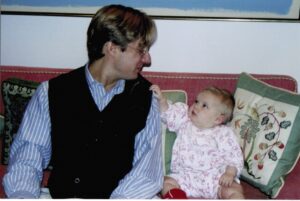Bereavement
The prospect of a child’s death feels cruel and unnatural. Children are “supposed” to outlive their parents, who hope to see them grow and develop and thrive into adulthood. It may seem impossible to imagine that your child will not reach these milestones. Scary as this may be, most parents of medically complex children consider that possibility at some point—some as early as at diagnosis. Some parents don’t wish to think about death or want to wait for a certain moment. When you are ready, understanding what may be ahead can be helpful.

Your Team:
A member of the clergy who is responsible for the religious needs of an organization and/or its constituents.
A mental health professional who specializes in bereavement and loss.
Specialized care for people whose prognosis is measured in months instead of years, and the desire is to focus on comfort.
A specialist whose aim is to improve the quality of life of their patients over the course of their illness regardless of stage, by relieving pain and other symptoms of that illness.
A mental health professional who uses therapy and other strategies to support coping and adjustment and treat concerns regarding social, emotional, or behavioral functioning.
A trained professional who works with people, groups and communities to help them better their lives.
An individual who leads and/or guides individuals or groups coping with life experience and challenges.
A psychologist, social worker, chaplain and/or spiritual leader or palliative care clinician or hospice team can support you, your co-caregiver, and other family members in processing strong emotions. A hospice team or grief counselor is specially trained in bereavement support and can also recommend support groups and other resources.
With time, you may experience bursts of new energy and ideas, or lingering questions, or regret, or relief, or all of these and more. Family dynamics and other relationships may change. One thing is certain: life is different, and it will never be the same.
It is typical and natural for grieving parents to question how they will survive and whether the family will survive. You may fear for your own health and safety, your parenting partnership, your surviving children. As each family member looks for ways to cope, you may find that your ways of grieving clash. For example, one might continue to question decisions they made, while another may be at peace. One might prefer quiet time while another wants to talk about the loss. One might turn to spiritual practice while another experiences loss of faith. One may want to display photos or mementos, and another may find it too painful to see these things. One may want to have others join in the sorrow while another wants to be alone or only with family members. And the feelings and responses will evolve over time.
These dynamics can create even greater tension in a household already struggling. Identifying, understanding and respecting the many ways in which people grieve can bring family, friends and community together in a spirit of love and support.
The Courageous Parents Network section “Coping with Loss” is an in-depth exploration of grief in bereavement, including grief behaviors to anticipate and understand, grieving with others, identity as parent and grief in siblings, with commentary from parents and clinicians.
– Aubrey, parent of De’Aubrey
Related Resources
-
 The Stockings Are Hung By the Chimney With CareBLOG
The Stockings Are Hung By the Chimney With CareBLOG -
 AdventBLOG
AdventBLOG -
 A bereaved mom: “I battled with guilt for a long time. Did we do her a disservice by keeping her on this earth for 5 months? I am learning to relinquish that because we had no clue.”video
A bereaved mom: “I battled with guilt for a long time. Did we do her a disservice by keeping her on this earth for 5 months? I am learning to relinquish that because we had no clue.”video -
 SurrenderBLOG
SurrenderBLOG -
 A mom on grief in bereavement: “I hope to be myself again.”video
A mom on grief in bereavement: “I hope to be myself again.”video -
![“I really appreciated the child-life specialist who guided us [through end-of-life for our older son.]”](https://img.youtube.com/vi/VI4wyRe9SLY/maxresdefault.jpg) “I really appreciated the child-life specialist who guided us [through end-of-life for our older son.]”video
“I really appreciated the child-life specialist who guided us [through end-of-life for our older son.]”video